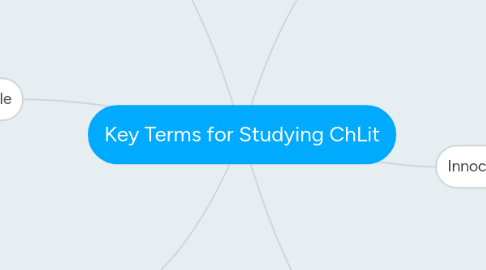Key Terms for Studying ChLit
von Martina Fiorentini

1. To Snuggle
1.1. Def: to lie or sit in a comfortable position, so that you feel like you are in nest or a crib. It is a typical children's activity that reminds them of motherly protection.
1.2. Synonym: to cuddle
1.3. Example: Children often like to create pillow forts and to snuggle into them.
1.4. Syllable: snug-gle
1.5. Stress: SNUG-gle
1.6. Part of speech: verb
2. Childish
2.1. Def: used to describe something that shows classic behaviors and ways of thinking adopted by children. It can have a negative connotation when used to say that something is inappropriate.
2.2. Synonym: immature
2.3. Example: Authors make a common and dangerous mistake when they relate main themes in children's literature to the childish nature of their readers.
2.4. Syllables: child-ish
2.5. Stress: CHILD-ish
2.6. Part of speech: adjective
3. Didactic
3.1. Def: predisposed to teach a moral or practical lesson. It is often used to describe the function and goal of most children's books.
3.2. Synonym: instructive
3.3. Example: The didactic purpose of some picture books is to teach young children how to memorize the alphabet by matching each letter with an illustration.
3.4. Syllable: di-dac-tic
3.5. Stress: di-DAC-tic
3.6. Part of speech: adjective
4. Genre
4.1. Def: category of different art forms that share similar characteristics. According to some scholars, it can refer to children's literature as this possess all the requirements for belonging to its own kind of art.
4.2. Synonym: Style
4.3. Example: one of the main dilemmas that gives inspiration to many studies, is whether children's literature should be considered as a single genre, or if multiple genres should be distinguished within this category.
4.4. Syllable: gen-re
4.5. Stress: GEN-re
4.6. Part of speech: noun
5. Innocence
5.1. Def: absence of understanding evil concepts or engaging in corruption. It is often related to the state of children as they are unable to see immorality in the world.
5.2. Synonym: purity
5.3. Example: Most children's book avoid dealing with sexuality in order to protect the readers' innocence.
5.4. Syllable in-no-cence
5.5. Stress: IN-no-cence
5.6. Part of speech: noun
6. Authority
6.1. Def: the privilege to determine rules or making decisions. It is the main tool that adults use in order to shape children's literature.
6.2. Synonym: order
6.3. Example: Parents have the authority of selecting what their children are going to read.
6.4. Grammar: au-thor-i-ty
6.5. Stress: au-THOR-i-ty
6.6. Part of speech: noun


